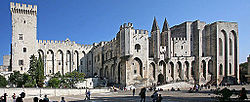A request that this article title be changed to 1342 conclave is under discussion . Please do not move this article until the discussion is closed. |
This article relies largely or entirely on a single source .(June 2016) |
| Papal conclave May 1342 | |
|---|---|
| Dates and location | |
| 5–7 May 1342 Palais des Papes, Avignon | |
| Key officials | |
| Dean | Pierre Desprès |
| Camerlengo | Gasbert de Valle |
| Protopriest | Imbert Dupuis |
| Protodeacon | Guillaume de Farges |
| Elected pope | |
| Pierre Roger Name taken: Clement VI | |
 | |
The papal conclave held from 5 to 7 May 1342 was convened after the death of Pope Benedict XII and elected Cardinal Pierre Roger to succeed as pope. The fourth pope of the period of the Avignon Papacy, he took the name Clement VI.
